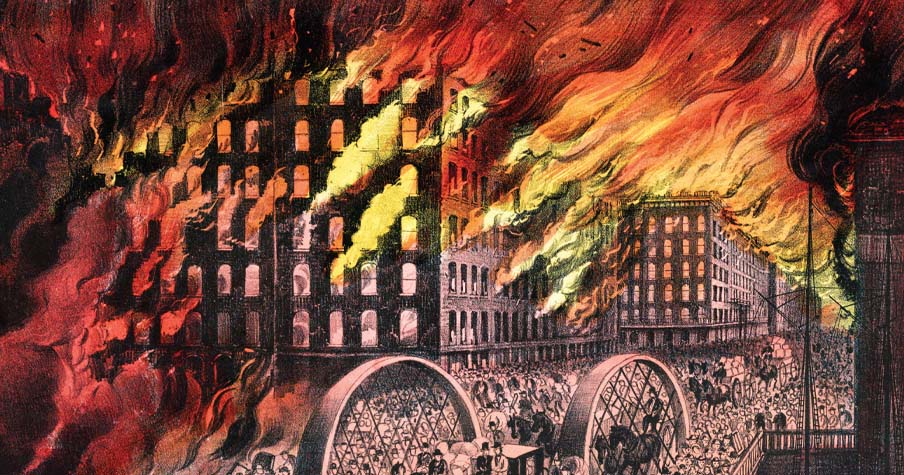
iStock Image
This fall marks the 150th anniversary of the Great Chicago Fire. A slight shift in the wind spared the Lincoln Park campus of McCormick Seminary (then known as the Theological Seminary of the Northwest) – but that same wind propelled the flames so that many seminary board members and key donors lost everything. The most significant congregations then supporting the seminary also were devastated.
After the firestorm, which burned from Oct. 8–10, 1871, witnesses recalled how neighbors did not recognize each other because their faces and clothes had been so badly charred. They described how the blaze seemed to turn night into day and how the towering, roaring flames silenced the usual city sounds and the clanging alarm bells. As the fire raged, some Chicagoans rushed west and north while others headed east toward Lake Michigan. Some threw their belongings into still-open graves in the former cemetery of the recently renamed Lincoln Park – and then crawled in for their own protection. Still others, including Fourth Presbyterian’s pastor, David Swing, buried valuables in the lakeshore sands, never to be recovered.
By the morning of Tuesday, Oct. 10, a short and sudden rain doused the fire, which had left some 300 dead, 100,000 homeless, and around 18,000 buildings destroyed. Cyrus McCormick, prominent industrialist and the seminary’s financial mainstay, suffered great setbacks. Samuel Howe, who had stepped down from the seminary’s board after denominational changes in 1870, also sustained great losses from the fire. Historian LeRoy Halsey, himself a survivor, later wrote: “At no small risk of life he [Howe] escaped with his family from their burning dwelling, which, with all its contents, was soon laid in ashes. Thus deprived of earthly goods and thrown late in life upon his own exertions, he came forth from the fiery ordeal with a Christian character purified and refined as gold from the furnace.”
At McCormick, classes continued on the undamaged campus. Some students transferred to other seminaries for their final year, but 23 students graduated in the spring of 1872. Throughout the year students and faculty joined in the relief, ministering to those who took refuge on campus and to devastated congregations nearby. Denominational appeals for relief raised new congregational buildings and supported efforts to rebuild Chicago.
Citing the challenges of moving to a city that was in the midst of rebuilding, noted clergyman and teacher Dr. George Prentiss declined appointment to the faculty; McCormick’s board of directors nominated Francis Patton to the post of professor of didactic and polemic theology. This set the stage for the great heresy trial of 1874 involving Professor Patton and Fourth Presbyterian’s Swing – a Chicago fire of a different sort.